CROSS CULTURAL
“The first task of a leader is to define reality” (Max De Pree, founder of the De Pree Leadership Center). What is the cultural reality of the Western Territory–how is it changing and where is it heading?
Claude Nikondeha, cross cultural ministries secretary, shared some eye-opening statistics at TALC that help define “reality” in the West.
Over the last 90 years in the West, the Caucasian population has decreased by 35% while the Hispanic has increased by 28%, Asian 10% and Black 5%. In the past most immigrants to the U.S. came from Europe; today 54% come from Latin America.
This cultural shift is most dramatic in our inner cities and according to the 2000 census, ethnics are a majority in 25 Western cities, including Los Angeles at 78% and El Paso, Texas at 82%. Among youth in the West, ethnic youth are the majority.
Does The Salvation Army reflect this cultural reality? Of the 310 corps and outposts in our territory, over 100 are ethnic: Anglo 62%, ethnic 38%. Of the ethnic corps, 19% are Hispanic. Today 40% of senior soldiers are ethnic. In the past five years our ethnic senior soldiership has increased by 10% and our ethnic junior soldiership by 7%, while our Anglo membership is about the same. Among social service clients, 80% are ethnic.
While the Army’s ethnic membership is growing, 90% of its senior leaders and administrators are Caucasian. Our leadership does not reflect the reality of the cultural make-up of our members and those we serve.
The census bureau predicts this trend will continue. For the Army to thrive, its leaders will need to be well versed in cultural competence. Since the Hispanic population is the fastest growing, the Army must encourage and support its Hispanic leaders and promote spiritual growth and leadership among our Hispanic soldiers and friends.
For the Army, the goal is not separation of ethnic groups, but a unity that reflects our diversity. Our territory must strive to maintain an environment that is welcoming for all people of all races, cultures and ethnic backgrounds. Finally, we need to continue the transition from a mono-cultural ministry to a multi-cultural one. We must shift from saying, “What can we do for you?” or “What can you do for me?” to “How can we do it together?”
Cast a global vision
GOALS:
The World Comes to Us that we will increase in diversity and achieve full assimilation of all cultures and ethnic groups at all levels of The Salvation Army Western Territory.
Reaching Out to the World that officers, soldiers and friends will demonstrate increasing commitment to world missions by providing resources of people and money to win the world for Jesus.
OBJECTIVES The World Comes to Us:
- We will regularly publish a Spanish version of New Frontier by summer of 2004.
- We will initiate and facilitate ongoing learning experiences in multi-cultural ministry for all officers by 2005.
- We will, by 2004, in collaboration with the divisions, increase our support for current ethnic leaders by identifying language specific training resources and forums.
- We will increase the number of ethnic leaders in divisional and territorial leadership responsibilities (i.e. appointments and committees).
- The commands will identify specific units and will be intentional in training and empowering the ethnic leaders to assume full responsibility for community leadership.
- We will by 2005 celebrate our achievements in multi-cultural ministries.
OBJECTIVES Reaching out to the World:
- We will transition from the Heart Connection program to the IHQ Partners in Mission initiative by June 2003.
- Over the next two years (2005) the remaining two-thirds of all corps will have a trained and active missionary sergeant.
- We will realize a measurable increase in support of world missions with people and money by 2004.












